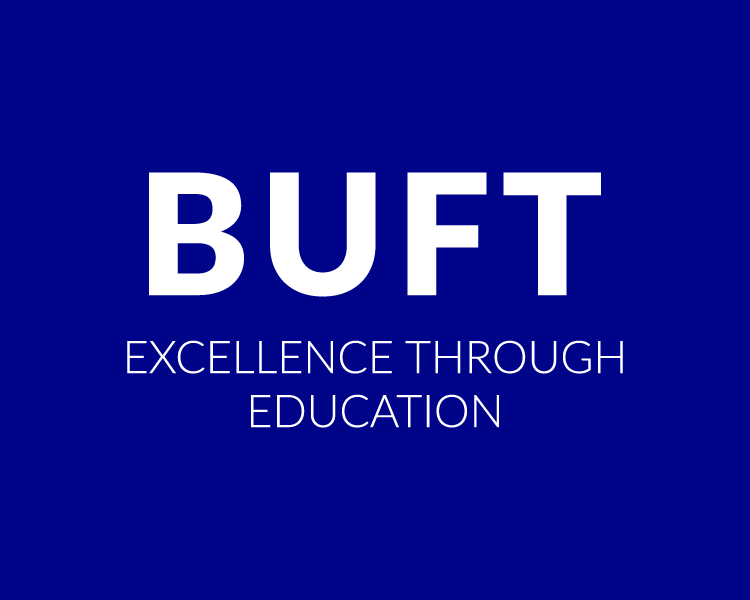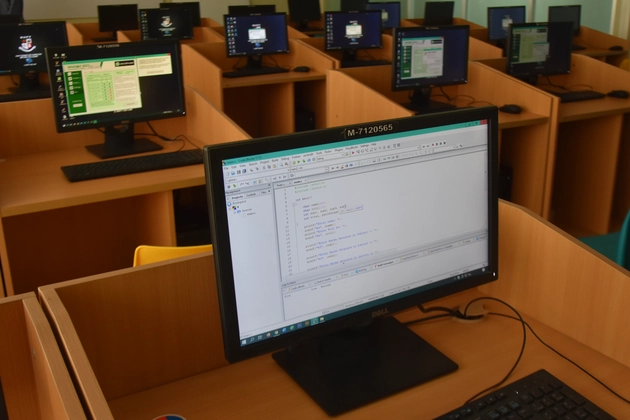
Department of
Computer Science & Engineering (CSE)
Computer Science and Engineering is a rapidly evolving interdisciplinary field that is at the forefront of developing and implementing innovative technology solutions to address various social needs. With its diverse set of skills, knowledge, and problem-solving abilities, graduates of computer science and engineering programs are well-equipped to tackle complex issues across different industries and sectors. Their technical expertise, critical thinking skills, and collaborative problem-solving approach make them uniquely positioned to drive innovation and positively impact society, by developing effective solutions to complex social problems.
The Department of Computer Science and Engineering at BUFT is a new department, established in November 2022, with a mission to serve the needs of the nation by providing quality education and innovative, relevant research programs in computer science and engineering. The department aims to produce graduates who are well-equipped to meet the evolving needs of the technology industry and make meaningful contributions to society.
The department offers a B.Sc. in CSE program, as well as research opportunities and industry partnerships that equip students with the skills needed to succeed in the technology industry. Graduates of CSE programs are highly sought after across industries, including technology, finance, healthcare, and government. The department provides exposure to emerging technologies, including artificial intelligence, cybersecurity, machine learning, and data science, enabling graduates to become leaders in their fields. Students have numerous research opportunities, including collaboration with industry partners, that enable them to gain practical experience and make meaningful contributions to the field. The department also hosts industry events, hackathons, and networking opportunities that provide students with connections and potential job opportunities.
We welcome you to be a part of the department of Computer Science & Engineering family. Our faculty and staff are committed to helping students achieve their academic and professional goals, and we look forward to providing you with the knowledge, skills, and experiences needed to succeed in the dynamic and exciting field of computer science and engineering. Let us work together to meet the future challenges in the ICT sector and compete in the international market to make this country a "Smart Bangladesh."
Vision of the department
Mission Statement
M 1: To provide quality education to meet the technological needs of society.
M 2: To carry out research in frontier areas of computer science and engineering.
M 3: To serve the community through extension and professional services.
Program of Study
The Bachelor of Science in Computer Science and Engineering (B.Sc. in CSE) is a four-year program designed to give students a solid foundation in Computer Science and Computer Engineering. A student must earn 156.00credits from a wide range of courses provided by the University in order to earn a B.Sc. in Computer Science and Engineering degree in an internationally recognized engineering fraternity. This degree will be made significant contributions to the global betterment of lifestyle.
CSE curriculum integrates not just computational knowledge with applied engineering, but also other related subjects of study, including the humanities, accountancy, presentation skills, creativity, teamwork, and business and management abilities. In present-day industries, these abilities are seen as absolutely necessary for an engineer to tackle the challenges of real-world situations. In the majority of circumstances, a career in engineering entails a complex network of interconnected factors. An engineer operating in a real-world environment must be vigilant, proactive, and aware of all the surrounding situations. Therefore, education in CSE might be considered an example of a well-rounded education.
B.Sc. in CSE (Code: 621)
B.Sc. in CSE program has been designed with a mission is to discover ICT-based new ideas, promote knowledge and apply them for the welfare of the nation. The dedication of the department involves establishing a knowledge-based academic environment where the skilled faculty members offer their best output and students are encouraged to show their best performance.
Profile of the program
- Name of the Degree: Bachelor of Science in Computer Science & Engineering, abbreviated as BSc in CSE
- No. of credits: 156
- Medium of Instruction: English
- Duration: Four years (8 Semesters of Six Months each i.e: Spring and Fall)
- Courses Start: Spring (January) & Fall (July) each year
- Standard time to attain the Degree: Four years (eight semesters, six months each)
- Minimum grade to attain the Degree: 2.50 in a scale of 4.00
The graduates will be familiar with an active research areas include image processing, pattern recognition, computer vision, software engineering, e-commerce, database systems, data mining, data warehousing, multimedia systems, computer networks, internet technologies, computer graphics, algorithms, signal processing, mobile computing, artificial intelligence, neural networks, robotics, embedded systems, parallel processing, machine translation, automatic program construction, and so on.
Accreditation of the Program
The syllabus for B.Sc. in Computer Science & Engineering program has been designed with experts from BUET and according to the guidelines of the University Grants Commission (UGC) of Bangladesh.
Subjects Taught
Category wise courses and credit summary:
| # | Categories | Credits | Percentage |
|---|---|---|---|
| 1 | Major | 77.25 | 49.52 |
| 2 | General Electives | 41.25 | 26.44 |
| 3 | Deepening Specialization | 18.75 | 12.02 |
| 4 | Interdisciplinary Minor | 18.75 | 12.02 |
| Total | 156.00 | 100.00% | |
Major
- Structured Programming Language
- Structured Programming Language Lab
- Object Oriented Programming
- Object Oriented Programming Lab
- Discrete Mathematics
- Algorithm and Data Structures I
- Algorithm and Data Structures I Lab
- Software Development Project I
- Digital Logic Design
- Digital Logic Design Lab
- Algorithm and Data Structures II
- Algorithm and Data Structures II Lab
- Software Development Project II
- Data Communication
- Microprocessor and Assembly Language
- Microprocessor and Assembly Language
- Microprocessor and Assembly Language Lab
- Numerical Methods
- Numerical Methods Lab
- Theory of Computation
- Technical Writing and Presentation
- Computer Networks
- Computer Networks Lab
- Computer Architecture
- Database Management Systems
- Database Management Systems Lab
- Operating Systems
- Operating Systems Lab
- Software Development Project III
- Compiler
- Compiler Lab
- Software Engineering and Information System Design
- Software Engineering and Information System Design Lab
- Artificial Intelligence
- Artificial Intelligence Lab
- Computer Graphics
- Computer Graphics Lab
- Ethics in Computer Science
General Electives
- Basic English Language
- Basic English Language Lab
- Bangladesh Studies
- Introduction to Sociology
- Introduction to Economics
- Financial and Managerial Accounting
- Differential Calculus and Coordinate Geometry
- Integral Calculus, Ordinary and Partial Differential Equations
- Linear Algebra, Matrices and Vectors Analysis
- Complex Variable, Fourier Analysis and Laplace Transform
- Basic Physics and Structure of Wave
- Basic Physics and Structure of Wave Lab
- Basic Chemistry
- Basic Chemistry Lab
- Optical Physics and Sound
- Optical Physics and Sound Lab
Interdisciplinary Minor
- Introduction to Electrical Engineering
- Introduction to Electrical Engineering Lab
- Engineering Drawing & CAD Lab
- Electronics Devices and Circuits
- Electronics Devices and Circuits Lab
- Basic Mechanical Engineering
- Probability and Statistics
- Industrial Management
Deepening Specialization (Any Five)
- Introduction to VLSI System
- Digital System Design
- Real Time Embedded Systems
- Simulation and Modelling
- Internet of Things
- Distributed System
- Wireless Networks
- Telecommunication System
- Advanced Computer Architecture
- Human Computer Interaction
- Digital Image Processing
- Digital Signal Processing
- Machine Learning
- Data Mining
- Advanced Algorithm
- Artificial Neural Network
- Natural Language Processing
- Computer Vision
- Pattern Recognition
- Robotics
- Basic Graph Theory
- Introduction to Bioinformatics
- Cloud Computing
- Multimedia Systems
- Fault Tolerant Systems
Program Education Objectives [PEOs]
The educational objectives of B.Sc. in Computer Science and Engineering program are as follows:
| PEO 1: | Sound knowledge in the common fields of computer science and engineering founded by the profound inheritance of basic, major and general course curriculum to address any related issues. |
| PEO 2: | Competence to work in fields requiring advanced knowledge, complex problem solving capability, maintaining restriction of time, requirement of multi-tasking and practice of ethical values. |
| PEO 3: | Improvise lessons learnt by seeking higher education or novel design/development innovations for the betterment and as per necessity of the nature of response required by the society and industry. |
Program Learning Outcomes [PLOs]
B.Sc. in Computer Science and Engineering graduates will be able to:
| PLO 1: | Technical knowledge: Apply the knowledge of mathematics, science, technical fundamentals, and a technical specialization to the solution of complex technical problems. |
| PLO 2: | Problem analysis: Identify, formulate, review research literature, and analyze complex technical problems reaching substantiated conclusions using first principles of mathematics, sciences, and technical knowledge. |
| PLO 3: | Design/development of solutions: Design solutions for complex technical problems and design system components or processes that meet the specified needs with appropriate consideration for the public health and safety, and the cultural, societal, and environmental considerations. |
| PLO 4: | Conduct investigations of complex problems: Use research-based knowledge and research methods including design of experiments, analysis and interpretation of data, and synthesis of the information to provide valid conclusions. |
| PLO 5: | Modern tool usage: Create, select, and apply appropriate techniques, resources, and modern technical and IT tools including prediction and modeling to complex technical activities with an understanding of the limitations. |
| PLO 6: | The technologist and society: Apply reasoning informed by the contextual knowledge to assess societal, health, safety, legal and cultural issues and the consequent responsibilities relevant to the professional technical practices. |
| PLO 7: | Environment and sustainability: Understand the impact of the professional technical solutions in societal and environmental contexts, demonstrate the knowledge of, and need for sustainable development. |
| PLO 8: | Ethics: Apply ethical principles and commit to professional ethics, responsibilities, and norms of the technical practices. |
| PLO 9: | Individual and teamwork: Function effectively as an individual, and as a member or leader in diverse teams, and in multidisciplinary settings. |
| PLO 10: | Communication: Communicate effectively on complex technical activities with the technical community and with society at large, such as, being able to comprehend and write effective reports and design documentation, make effective presentations, and give and receive clear instructions. |
| PLO 11: | Project management and finance: Demonstrate knowledge and understanding of the technical and management principles and apply these to one’s own work, as a member and leader in a team, to manage projects and in multidisciplinary environments. |
| PLO 12: | Life-long learning: Recognize the need for, and have the preparation and ability to engage in independent and life-long learning in the broadest context of technological change. |
Program Specific Outcomes [PSOs]
B.Sc. in Computer Science and Engineering graduates will be able to:
| PSO 1: | Apply their ideas and concepts to test, analyze, locate and solve modern day problems by propositions, modifications or innovations. |
| PSO 2: | Create strong positions in national and global networks as an efficient, creative, successful application/intelligence developer, machine learning/telecommunication engineer, data/research analyst/scientist, database/network system administrator and alike others. |
Generic Skills/ Graduate Profile
- Research Scientist
- Business Intelligence Developer
- Data Scientist
- Data Analyst
- Machine Learning Engineer
- Mobile/Web Application Developer
- UI/UX Developer
- Database Administrator
- Network System Administrator
- IT Support/Consultant
- Telecommunication Engineer, and
- many more.

